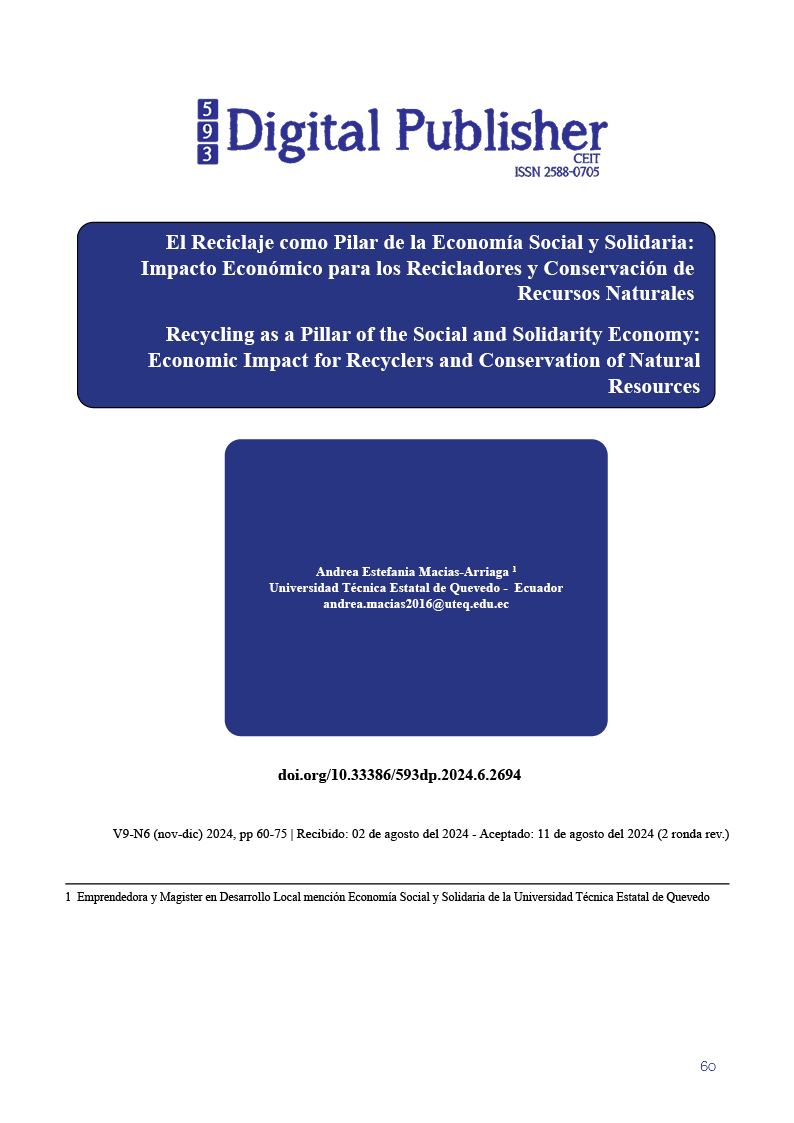Recycling as a Pillar of the Social and Solidarity Economy: Economic Impact for Recyclers and Conservation of Natural Resources
Main Article Content
Abstract
Solidarity Economy, originating from Social Economy, rethinks economic relations based on principles of justice, cooperation, reciprocity, and mutual aid. Instead of focusing on capital accumulation, this perspective places people and their work at the core of the economic system, promoting the economy as a means for personal and community development. Within this framework, the care economy and environmental justice highlight the need to recognize and value the work of recyclers, who, despite their crucial role in the circular economy, face unfavorable economic conditions.
Historically, recyclers, responsible for the collection, separation, and commercialization of waste, have been undervalued, and their contributions often ignored by public policies. Their work, essential to the recycling system, has been marked by precarious conditions, underscoring the urgency to improve their economic and social situation.
Recycling is fundamental not only to reduce deforestation and environmental pollution but also to provide raw materials through advanced industrial processes. In Ecuador, despite advances in waste sorting, especially plastics, there is still much to improve in recycling efficiency.
This article analyzes how recycling, integrated into the Social and Solidarity Economy, contributes to both the conservation of natural resources and the improvement of the working and economic conditions of recyclers.
Downloads
Article Details

This work is licensed under a Creative Commons Attribution-NonCommercial-ShareAlike 4.0 International License.
1. Derechos de autor
Las obras que se publican en 593 Digital Publisher CEIT están sujetas a los siguientes términos:
1.1. 593 Digital Publisher CEIT, conserva los derechos patrimoniales (copyright) de las obras publicadas, favorece y permite la reutilización de las mismas bajo la licencia Licencia Creative Commons 4.0 de Reconocimiento-NoComercial-CompartirIgual 4.0, por lo cual se pueden copiar, usar, difundir, transmitir y exponer públicamente, siempre que:
1.1.a. Se cite la autoría y fuente original de su publicación (revista, editorial, URL).
1.1.b. No se usen para fines comerciales u onerosos.
1.1.c. Se mencione la existencia y especificaciones de esta licencia de uso.
References
Arregin Emilce, A. M. (octubre de 23). La economía social y solidaria como herramienta de autonomía. Facultad de Trabajo Social, págs. 19-28. Obtenido de https://sedici.unlp.edu.ar/handle/10915/154501
Avina, F. (2 de Diciembre de 2021). Fundación Avina. Obtenido de Los recicladores hacemos una sociedad del cuidado: https://www.avina.net/los-recicladores-hacemos-una-sociedad-del-cuidado/
Bermeo Paucar Javier, R. S. (28 de febrero de 2018). EL RECICLAJE LA INDUSTRIA DEL FUTURO EN ECUADOR. UNIVERSIDAD, CIENCIA y TECNOLOGÍA, pág. 31. Obtenido de file:///C:/Users/Usuario/OneDrive/Escritorio/dc.%20tesis/183-article-478-1-10-20191007%20(1).pdf
Busch, A. (2023). Cerveceria Nacional. Obtenido de https://www.cervecerianacional.ec/sostenibilidad
Cajamarca Edisson, B. W. (1 de 4 de 2019). De cero a dinero: La basura como fuente principal para un negocio inclusivo de reciclaje en Cuenca (Ecuador). Revista de Ciencias de la Administración y Economía, págs. 74-75. Obtenido de file:///C:/Users/Usuario/OneDrive/Escritorio/dc.%20tesis/de%200%20a%20dinero%20articulo.pdf
Constante, S. (15 de Junio de 2023). EL PAIS. Obtenido de https://elpais.com/planeta-futuro/2023-06-16/un-ejercito-de-recicladores-de-basura-conectados-a-traves-de-una-aplicacion-en-ecuador.html
Galán Cubillo Javier, G. O. (3 de Junio de 2024). El enfoque de suficiencia y su papel en la economía circular y sostenibilidad. Universitat Politècnica de València. Obtenido de https://riunet.upv.es/handle/10251/204642
German, P. A. (julio de 2017). UNIVERSIDAD TÉCNICA DE AMBATO. Obtenido de https://repositorio.uta.edu.ec/bitstream/123456789/25901/1/T4042e.pdf
Guillermo, R. S. (2016). LOS RECICLADORES COMO ACTORES DE LA ECONOMÍAPOPULAR Y SOLIDARIA: ANÁLISIS DE LA ASOCIACIÓN 15 DE. UNIVERSIDAD ESTATAL PENINSULA DE SANTA ELENA, págs. 1-17. Obtenido de https://repositorio.upse.edu.ec/bitstream/46000/4011/1/UPSE-TOD-2016-0012.pdf
Henar, Á. C. (5 de Mayo de 2023). Las empresas de inserción como aliadas para llevar a cabo una transición ecológica, en particular en la economía circular y en los empleos verdes. Revista Jurídica de Economía Social y Cooperativa, págs. 167-210. Obtenido de file:///C:/Users/Usuario/Downloads/adminojs,+comen42-05.pdf
Ministerio del Ambiente, A. y. (2023). Ministerio del Ambiente felicita a la Red Nacional de Recicladores del Ecuador (Renarec) en su sexto aniversario de vida institucional. Obtenido de https://www.ambiente.gob.ec/ministerio-del-ambiente-felicita-a-la-red-nacional-de-recicladores-del-ecuador-renarec-en-su-sexto-aniversario-de-vida-institucional/
Salgado Tello, S. H. (15 de Enero de 2024). Economía circular para el desarrollo agroindustrial y social en Ecuador. Telos: Revista de Estudios Interdisciplinarios en Ciencias Sociales, págs. 297-322. Obtenido de https://ojs2.urbe.edu/index.php/telos/article/view/4533/6302
Sanmartín Ramón, G. Z. (enero de 2017). El reciclaje: un nicho de innovación y emprendimiento con enfoque ambientalista. Universidad y Sociedad, págs. 36-40. Obtenido de file:///C:/Users/Usuario/OneDrive/Escritorio/dc.%20tesis/rus05117.pdf
Sostenibilidad, C. E. (8 de Junio de 2023). CERES. Obtenido de https://www.redceres.com/post/cerveciria-nacional-el-reciclaje-pet-en-ecuador-fortalece-iniciativa-de-economia-circular-inclusiva
Toro Estefani, N. M. (Julio de 2016). CEPAL. Obtenido de file:///C:/Users/Usuario/OneDrive/Escritorio/dc.%20tesis/S1500804_es.pdf
Unai Villalba Eguiluz, G. C. (16 de Noviembre de 2020). Complementariedades entre economía social y solidaria y economía circular Estudios de caso en el País Vasco y Suiza Occidental. Hegoa, Instituto de Estudios sobre Desarrollo y Cooperación Internacional, págs. 1-66. Obtenido de https://publicaciones.hegoa.ehu.eus/uploads/pdfs/480/Lan_koadernoa_83.pdf?1608552181
Valencia Melanie, L. C. (mayo de 2021). LIBRO BLANCO de la Economia Circular de Ecuador. Obtenido de file:///C:/Users/Usuario/OneDrive/Escritorio/articulo%20compensacion/Libro-Blanco-final-web_mayo102021.pdf


